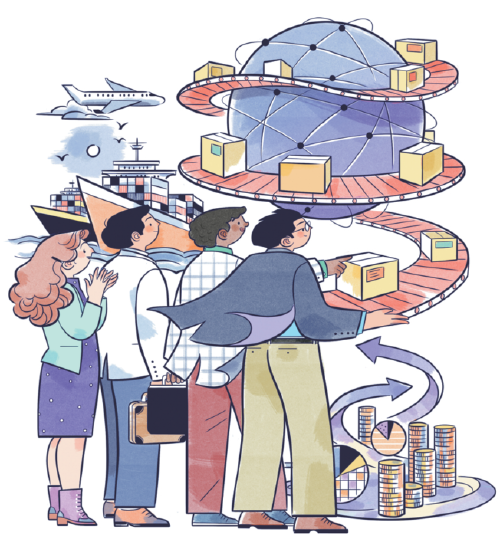
LI Min/China Daily
The global economy is facing a new turning point amid multiple crises. Over the past three years, the Covid-19 pandemic and geopolitical conflicts have overshadowed economic growth. According to the World Economic Forum’s Global Risks Report 2023, these conflicts and geo-economic tensions have fueled interconnected global risks, including energy and food supply shortages, cost-of-living crises and debt servicing challenges, and are likely to continue. Although tensions between China and the US show promising signs of easing over the next two years, uncertainty remains.
Nevertheless, at a time when the global economy is facing major challenges, several key economic indicators are showing positive upward trends. Major economies have remained resilient and emerging economies have managed to steer clear of the financial crisis. In Europe, the burden of higher gas prices seems to have eased, leading to higher incomes, higher consumption and lower inflation. China’s economy is stable and back to a good start. It reported growth of 4.5 percent in the first quarter, which was better than expected.
Where is the world going? At this pivotal moment in the global economic recovery, the World Economic Forum’s Annual Meeting of New Champions returns as a physical event after three years and will be held in Tianjin, China, from June 27-29. More than 1,500 global leaders and innovators from business, government, academia, civil society and international organizations will gather to engage in conversations on how to revitalize innovation in Asia and around the world. Led by entrepreneurs, they will explore ways to revitalize the global economy, establish new business models and partnerships, and steer the global economy towards a more equitable, sustainable and resilient future.
Although the process will be challenging, if we work together for a shared future, 2023 will be a year of economic recovery. Stability, transparency, sustainability and policy predictability are critical to rebuilding the confidence of entrepreneurs as creators of social wealth and drivers of innovation. Meanwhile, green industries and innovative technologies are essential to promote a just transition and achieve long-term sustainable development.
As the world’s second largest economy and a major trading partner for more than 140 countries and regions, China accounts for the largest share of global goods trade, reflecting its importance in the international economic system. 2023 is expected to see a rebound in China’s economy, with the IMF forecasting 5.2 percent GDP growth, boosting the regional and global economy. While facing long-term challenges such as potential productivity growth stagnation and demographic changes, China is well-positioned to turn these challenges into opportunities by promoting green and innovative industries and fostering inclusive and sustainable growth.
China aims to peak its carbon emissions by 2030 and achieve carbon neutrality by 2060, which presents unprecedented difficulties and demands enormous efforts. Globally, factors such as geopolitical conflicts, energy crises and industrial fragmentation are increasingly impeding climate action. In this context, international cooperation is particularly important.
To address climate change, we must mobilize global resources for cross-border, cross-sector and cross-industry collaboration. We are pleased to see that many Chinese companies have already recognized the Forum’s unique value and are actively partnering with the Forum on initiatives to advance climate change action.
As countries recover and prices stabilize, pent-up consumer demand is unleashed. The pandemic accelerated changes in consumption habits, significantly affecting all sectors and shaping the future business and consumption landscape. Retail and service sectors, which have been hit hardest by the pandemic, must adapt to changing consumer habits and prepare for the consumer boom.
As of 2018, the forum has selected 150 lighthouse factories in global advanced manufacturing, 50 of which are in China. These companies integrate advanced technologies in strategic planning, manufacturing processes, customer management, supply chains and after-sales services. Meanwhile, emerging technologies such as artificial intelligence, quantum computing, and bioengineering offer limitless opportunities and new considerations.
According to the Forum’s Chief Economist Outlook 2023, to successfully navigate the unpredictable path, countries will need to work together to adapt to the changing environment. Achieving these goals means establishing and strengthening public-private and East-West dialogues, encouraging stakeholder participation, moving entrepreneurship from idea to reality, and effecting positive change at scale.
In January, China’s then-Vice Premier Liu stressed at the forum’s annual meeting in Davos that openness is driving reform, growth and China’s economic progress, and that China’s doors will continue to widen. The Forum will continue to work to build bridges between East and West, deepen understanding, accelerate cooperation, strengthen dialogue and mitigate conflicts. And we hope that Chinese companies will join this process and contribute to a better world.
The author is Greater China, President of the World Economic Forum.
Views do not necessarily represent those of China Daily.
If you have specific expertise or want to share your thoughts on our stories, please send us your writings to [email protected] and [email protected].

„Oddany rozwiązywacz problemów. Przyjazny hipsterom praktykant bekonu. Miłośnik kawy. Nieuleczalny introwertyk. Student.
